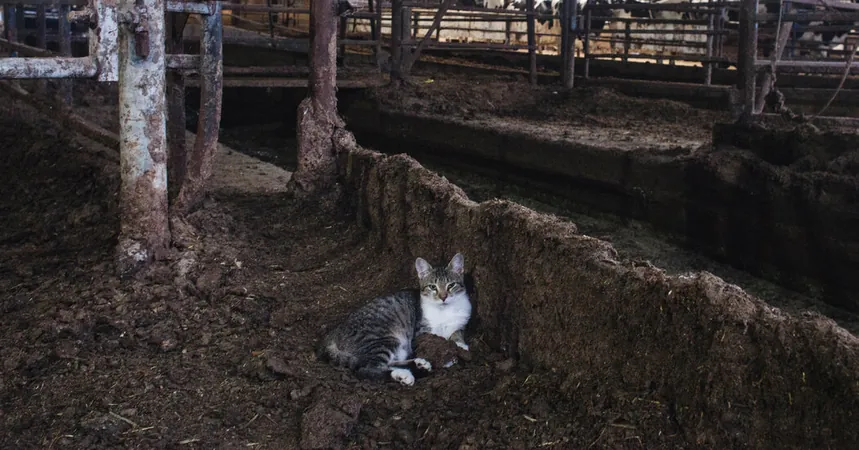
Cats at Risk: Could Raw Pet Food Expose Your Feline Friend to Bird Flu? Here's What You Need to Know!
2025-01-23
Author: Jia
In a startling turn of events, federal health officials are investigating a rise in bird flu infections among cats, with some tragic cases leading to fatalities after consuming contaminated raw pet food. This wave of infections is linked to the H5N1 virus, which poses a significant threat, especially to our feline companions.
Since December, over two dozen cases of bird flu have been reported in domestic cats across the United States, with alarming connections to virus-contaminated raw milk and commercially available raw pet food. This alarming trend has led one major pet food manufacturer to initiate a recall of its products, reflecting growing concerns about pet food safety standards.
Dr. Steve Grube, a chief medical officer at the U.S. Food and Drug Administration (FDA), warned during a briefing that bird flu "is an emerging contaminant in animal food." However, experts stress there is no need for panic among pet owners. Currently, there is no evidence indicating that infected cats can transmit the virus to humans, as cases have specifically been associated with unpasteurized milk or raw meat products.
Most commercial pet foods are subjected to cooking or heat treatment processes, which are generally effective at eliminating threats like the bird flu virus. Phyllis Entis, a microbiologist specializing in food safety, reassured that "the heat of processing should be enough to inactivate the virus."
Despite the assurances, the recent cat infections underscore a critical gap in food supply chain safety and surveillance, raising the alarm on potential vulnerabilities. Kristen Coleman, an infectious disease researcher from the University of Maryland, highlighted, "We really don’t have a sense of how widespread this virus is, and we’ve already seen several cases of it sneaking up in the pet food supply. It’s a huge vulnerability."
How Are Cats Getting Infected?
Cats have long been known to be prone to the G5N1 virus. Sporadic cases have been documented previously, often traced back to feline encounters with infected wild birds. Indoor cats are now increasingly being affected, sometimes with no known contact with infected wildlife or farms. For instance, in December in Oregon, a pet cat consumed frozen raw food from Northwest Naturals and subsequently died. Testing confirmed the presence of the H5N1 virus in both the cat and the food.
California has reported similar incidents, with multiple cats falling ill after being fed raw pet food, including two cases where cats tragically lost their lives.
How Does the Virus End Up in Pet Food?
The exact pathways for virus contamination in pet food are unclear. However, preliminary investigations indicate that some viral samples from infected cats show a genetic connection to turkey farms in Minnesota. Generally, when bird flu is detected in commercial poultry, strict regulations mandate the culling of all infected birds to prevent the virus from entering the food supply. Yet, in rare instances, birds may be asymptomatic carriers right before being processed, which poses a potential risk.
While the FDA requires manufacturers to maintain rigorous safety plans, experts like Ms. Entis warn that resource limitations can hinder effective oversight, leading to gaps in regulation and potential contamination slipping through undetected.
Government Response and Future Actions
In response to these alarming developments, the FDA announced new policies stipulating that pet food companies must revise their food safety strategies to tackle the possible hazards posed by bird flu. The effectiveness and industry compliance with these measures remain to be seen, as companies may choose to either enhance their safety protocols or find loopholes in existing plans.
As the danger from H5N1 escalates, the USDA has also ramped up surveillance measures for large turkey farms in Minnesota and South Dakota, aiming to prevent potential outbreaks from permeating further into both pet and human food supplies.
As a cat owner, it’s crucial to remain vigilant about your pet’s diet. Opting for cooked or heat-treated food might be a safer choice in light of these recent events. This is a developing story, and we must stay informed to protect our beloved furry friends. Stay tuned for more updates on this critical health issue!




 Brasil (PT)
Brasil (PT)
 Canada (EN)
Canada (EN)
 Chile (ES)
Chile (ES)
 Česko (CS)
Česko (CS)
 대한민국 (KO)
대한민국 (KO)
 España (ES)
España (ES)
 France (FR)
France (FR)
 Hong Kong (EN)
Hong Kong (EN)
 Italia (IT)
Italia (IT)
 日本 (JA)
日本 (JA)
 Magyarország (HU)
Magyarország (HU)
 Norge (NO)
Norge (NO)
 Polska (PL)
Polska (PL)
 Schweiz (DE)
Schweiz (DE)
 Singapore (EN)
Singapore (EN)
 Sverige (SV)
Sverige (SV)
 Suomi (FI)
Suomi (FI)
 Türkiye (TR)
Türkiye (TR)
 الإمارات العربية المتحدة (AR)
الإمارات العربية المتحدة (AR)